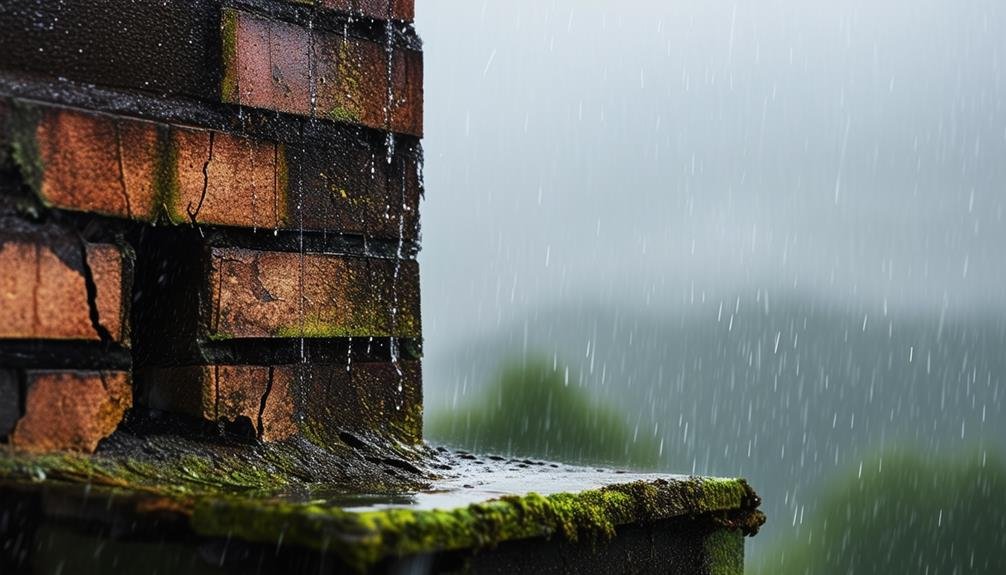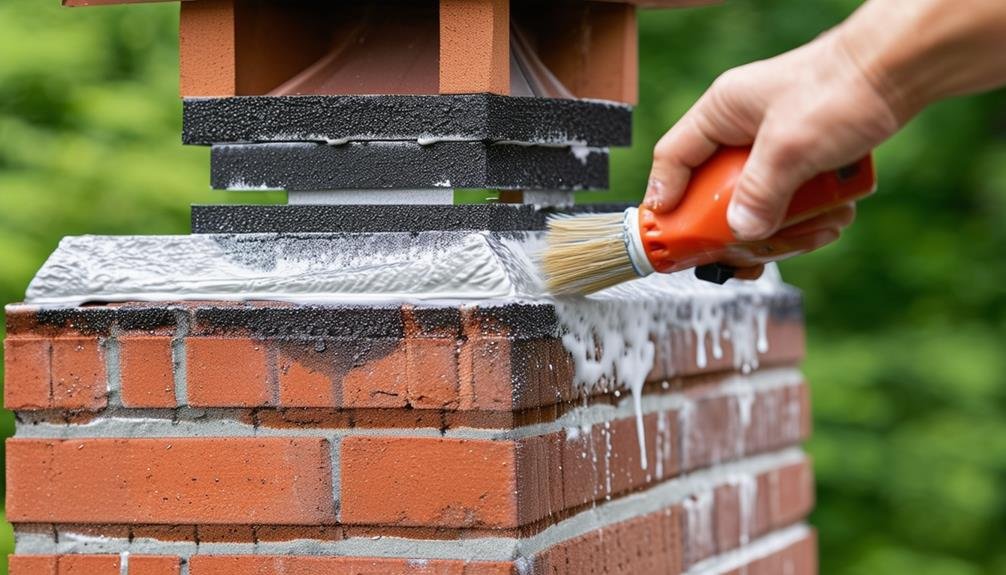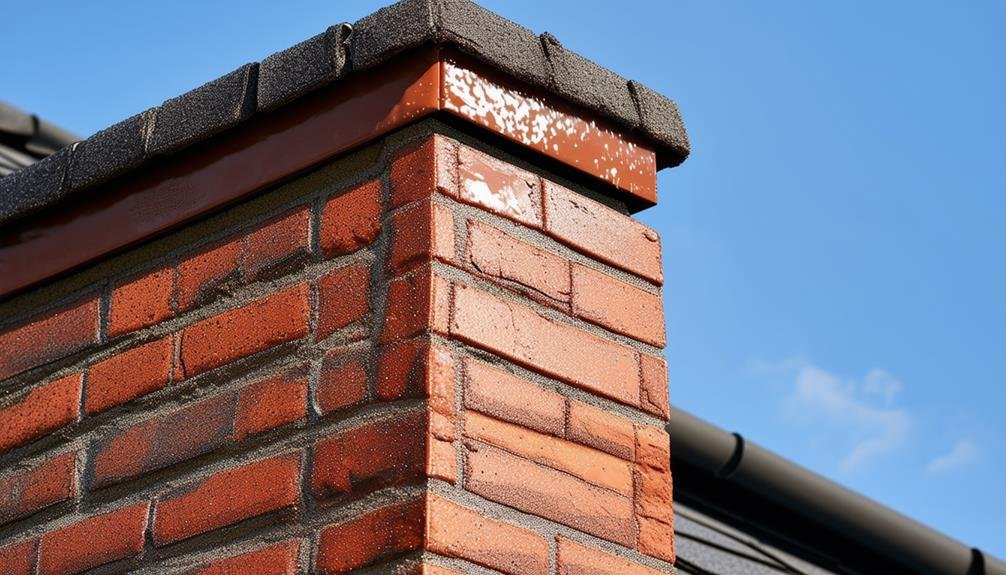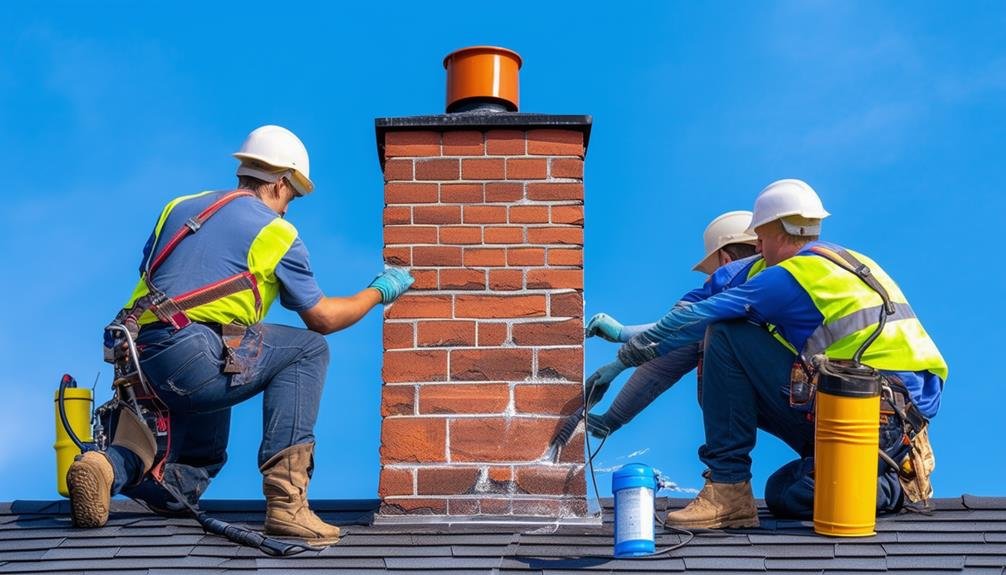You might not think about it often, but chimney waterproofing is crucial for your home’s maintenance. Ignoring it can lead to water damage, mold, and even structural issues. By taking the right steps, you can prevent these problems and save on costly repairs in the long run. So, what exactly causes chimney leaks, and how can you effectively protect your chimney from water infiltration? Whether you’re considering DIY methods or hiring a professional, understanding the importance and techniques of chimney waterproofing is essential. Let’s explore the best ways to keep your chimney—and home—safe and dry.
Importance of Chimney Waterproofing
In today’s homes, chimney waterproofing is crucial to prevent water damage, mold growth, and structural deterioration. By taking proactive measures to safeguard your chimney, you’re not just protecting the structure but also enhancing your home’s overall health and longevity.
The benefits of waterproofing are numerous. Proper sealing extends the lifespan of the chimney, reduces maintenance needs, and preserves your home’s value. Plus, it enhances curb appeal by preventing unsightly staining and shielding against harsh weather elements.
For those who enjoy taking matters into their own hands, there are effective DIY waterproofing tips you can follow. Start by thoroughly cleaning your chimney to eliminate any dirt and debris. This ensures that the waterproofing materials adhere properly.
Next, inspect for any cracks or gaps and seal them with a high-quality masonry caulk. Once sealed, apply a breathable, water-repellent sealant designed specifically for chimneys. Make sure to cover every inch, focusing on the crown and flashing areas, which are most vulnerable to water penetration.
Common Causes of Chimney Leaks

Several factors can lead to chimney leaks, each requiring prompt attention to prevent further damage. Damaged flashing, cracked crowns, deteriorating masonry, and poor chimney caps are common culprits.
Your flashing, which seals the space between the chimney and roof, can degrade over time, allowing water to seep through. DIY waterproofing solutions might help temporarily, but professional repair is often necessary for long-term fixes.
Cracked crowns, the tops of your chimneys, allow water to trickle down into the structure, causing serious issues. Deteriorating masonry, due to water penetration through porous bricks and mortar, compromises the chimney’s integrity.
Signs of chimney leaks, such as water stains on walls, musty odors, or visible mold, shouldn’t be ignored. Poorly fitted or missing chimney caps also let rainwater and debris into your chimney, leading to blockages and water damage.
Improper installation or lack of maintenance can exacerbate these problems. Regular inspections help you catch these issues early, ensuring your chimney remains in good condition.
Effective Waterproofing Techniques

Waterproofing your chimney effectively involves applying specialized products that create a vapor-permeable barrier, ensuring long-term protection against water damage. You’ll need to seal chimney crowns, flashing areas, mortar joints, and breast walls. These steps prevent water penetration by up to 99.9%, reducing the risk of spalling and structural damage. Professionals recommend applying multiple coats to chimney breasts due to their higher exposure levels.
| Technique | Benefits |
|---|---|
| Sealing Crowns | Prevents cracks and leaks |
| Flashing Areas | Stops water from seeping into the house |
| Mortar Joints | Keeps the structure intact |
When considering the application process, you have to decide between DIY and hiring professional services. DIY waterproofing can be cost-effective, allowing you to save on labor costs. However, it requires a fair amount of skill and the right materials, like Permagard’s Microshield Ultra, known for its lasting protection against water ingress.
| Option | Cost Comparison |
|---|---|
| DIY | Lower initial cost, higher risk of errors |
| Professional Services | Higher cost, guaranteed expertise |
Choosing the Right Sealer

When selecting a sealer for your chimney, you must consider compatibility with the chimney’s material and condition to guarantee maximum protection. Different types of sealers, like silane, siloxane, and acrylic, offer varying degrees of water resistance and durability. For instance, silane and siloxane are excellent for brick chimneys, while acrylic sealers might be more suitable for concrete or stone chimneys.
You should also factor in local weather conditions and budget constraints. In harsh climates, a sealer with high durability and strong water-resistant properties is essential. Look for sealers that are easy to apply, as this can save you both time and effort. Application methods can range from brushing and rolling to spraying. Whichever method you choose, make sure it aligns with your comfort level and the sealer’s instructions.
Moreover, a sealer that balances aesthetic appeal and protective qualities can enhance your chimney’s look while keeping it safe. Always opt for environmentally friendly sealers that come with clear application instructions. This ensures that you can apply the sealer effectively, contributing to a sense of accomplishment and belonging within your community of DIY enthusiasts.
Professional Waterproofing Services

Hiring professional waterproofing services for your chimney guarantees it’s protected against water damage, structural deterioration, and mold growth. With over 20 years of experience, GTA Masonry offers expertise that assures your chimney stands strong against storms and moisture.
By opting for professional services, you’re embracing the waterproofing benefits that come with skilled technicians who know how to apply water repellent sprays, fill cracks, and install chimney caps effectively.
Investing in these services means you’re not just addressing current issues; you’re securing long term protection for your chimney. This proactive approach helps extend the lifespan of your chimney, reducing future maintenance costs and enhancing your home’s overall value. It’s more than just preserving the structure; it’s about maintaining the beauty and integrity of your brick chimney.
When you choose professional waterproofing, you join a community of homeowners who prioritize the health and longevity of their homes. You’re making sure your chimney doesn’t just withstand the elements but thrives, safeguarding your home from the detrimental effects of water ingress.
This investment in professional care assures your chimney remains a strong, beautiful feature of your home for years to come.
Frequently Asked Questions
What Is the Best Waterproofing for Chimneys?
You’ve got several great waterproofing materials to choose from. Consider Chimney Saver or Chimney Hero for long-lasting protection. Application tips: clean surfaces thoroughly and apply evenly. You’ll feel confident knowing your chimney’s protected against water damage.
How Do I Waterproof My Chimney?
To waterproof your chimney, you’ll need to handle flashing repairs and brick maintenance first. Apply water repellent sprays and consider professional sealing services. Regularly check for cracks and maintain your chimney to make certain it stays protected.
Is It Worth Sealing a Chimney?
Yes, it’s worth sealing a chimney. You’ll safeguard your home from weather damage and maintain its structural integrity. By doing so, you guarantee a secure, long-lasting home, fostering a sense of belonging and pride.
How Much Does It Cost to Seal a Chimney?
You’ll spend between $500 and $2,000 to seal your chimney, factoring in chimney inspection and any necessary masonry repairs. Investing in professional services guarantees long-lasting protection and connects you with experts who care about your home’s safety.
Conclusion
To sum up, making chimney waterproofing a top priority is crucial for upholding your home’s integrity and avoiding expensive repairs. By tackling common causes of leaks and utilizing effective waterproofing techniques, you can safeguard your chimney from water damage.
Select the appropriate sealer and consider professional services for optimal outcomes. By doing so, you’ll guarantee that your chimney remains durable, beautiful, and able to withstand harsh weather conditions, ultimately preserving your home’s value and curb appeal.
